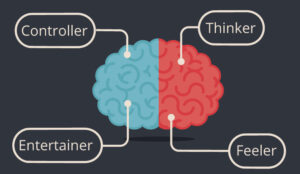How much is work-from-home (WFH) success about the personality of the people on the team?
During the pandemic, when so many organisations were forced to adopt WFH practices, there were many reports of people who hated it. They wanted to be in the office surrounded by people, and their complaints were often viewed as a normal reaction to the ‘isolation’ of WFH.
But the opposite is also true, plenty of people really have grown to love the WFH environment. They don’t have the disturbance of constant interruptions.
They can get on with their work and focus on it in a way that is far more productive than an office environment. Indeed a leading UK recruitment consultant posted this week that they’d had 14 times as many people apply for a fully remote role than for a hybrid (home/office) one.
So is it possible to identify ‘ideal’ personality traits that could be encouraged when hiring people to WFH? And if managers were focused on the personality traits required for WFH then could they take this approach even further? Could having the right traits for WFH, for example, be a good reason to be promoted?
We can see that in an office environment it is often the people with the best social skills and connections that get on and sometimes to the detriment of those that are more productive. Would this be entirely different when measuring people based on WFH performance?
I believe there could be several differences. We’ve seen through lockdown that many WFH teams have been managed with a strong focus on what they’ve achieved, with less of a focus on who is friendly with who inside the company.
Of course all these connections can still exist but the nature of remote work means that tangible results can be a more valuable currency.
The questions posed above are important for any company that has a strong corporate identity and culture because WFH adds a new dimension. Not only do you need to recruit people that are ideal for representing the brand, but you need to also ensure they have the right personality for WFH.
Think about different brands like Google, John Lewis, GiffGaff, Virgin, or TikTok. They all have a strong sense of identity. They have a brand and people immediately know that service from Virgin will be different to that from John Lewis.
In a traditional contact centre environment those differences can be reinforced through training and by team leaders; in the WFH environment – where training and team leadership is equally, if not more, important – it is also important that the personality of people who flourish in the WFH environment is taken into account in order to bring about success.
There are many personality experts and tests out there – not many of them appear to have much scientific weight, but it’s clear that introverts and extroverts usually respond to home working in a different way.
However, the stereotype is that introverts are happy to sit at home working alone and extroverts need to feed off groups of people in an office to gain their energy.
In the modern WFH environment this advice is dated. Many Gen Z are entirely comfortable spending time socialising with friends online.
They grew up using chat and they now talk to friends in the evening when playing Fortnite. Being social or responding as an extrovert is no longer restricted to literally being in a room with a large number of people.
Many WFH environments are designed to allow colleagues to work together, train together, and even socialise together without needing to be in the same place.
I think there are some interesting questions here that are worth more exploration because it’s clear that some personalities work better in the WFH environment, but then not every WFH environment is the same.
We need to consider adviser personality during hiring and training, but in an entirely new way that acknowledges how they can fit into the team and contribute to the success of the organisation.
Author: Guest Author
Published On: 2nd Aug 2022
Read more about - Guest Blogs, Sensee















